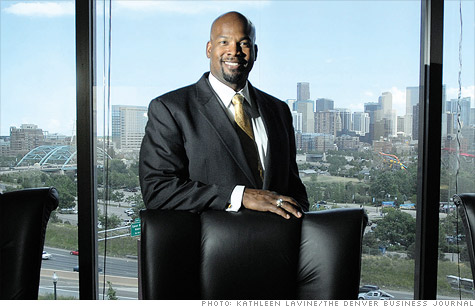Search News

Richard Lewis says being a veteran helps his IT business RTL Networks.
NEW YORK (CNNMoney) -- Soldiers returning from the wars in Iraq and Afghanistan can look forward to a different kind of action when they reach U.S. soil: help for their businesses.
More government agencies and private firms are setting aside more contracts -- or procurement goals --for veteran-owned companies.
The trend comes as President Barack Obama visited the Washington Navy Yard last Friday to propose a series of job-boosting moves for veterans, including tax credits for firms that hire unemployed veterans and a challenge to the private sector to hire 100,000 unemployed veterans or their spouses by 2014.
"Just think about how many veterans have led their comrades on life and death missions by the time they were 25 years old," said Obama. "That's the kind of responsibility and experience that any business in America should want to take advantage of."
According to the National Veteran-Owned Business Association, 18 states have some sort of legislation favorable to veteran-owned businesses or have laws that help create opportunities when it comes to state-government contracting. That's up from 12 in 2008.
At the same time, veterans advocates said more veterans are using their status to help market their business.
"Ten years ago, fifteen years ago, you rarely if ever saw a business owned by a veteran that indicated it was a veteran-owned business," said William Elmore, the associate administrator for veterans business development at the Small Business Administration, a federal agency that assists small business development.
Eric Steele served on submarines for the Navy from 1987 to 1994 before founding Blue Morpho Technologies, a computer service company based in Burlington, Vt. Steele said he tailors his use of his veteran status for marketing, using it for customers like the Department of Veterans Affairs.
"If I'm talking to the VA, that's the first thing out of my mouth," said Steele.
Steele said he's had more than 40 small-quantity hardware purchases made by Veterans Affairs hospitals over the past two years after his status was spotted on an online registry of veteran-owned businesses.
Although those sales make up less than five percent of his annual revenue, he attributes them to a growing awareness of veteran entrepreneurs.
"I think there is an interest, particularly from the VA," said Steele. "They're obviously mandated to help veterans, and I think that's just another way they can help."
Meanwhile, more private businesses are establishing goals for veteran-owned businesses.
"I think one of the other big steps has been corporate America," said Matthew Pavelek, the director of communications at the National Veteran-Owned Business Association.
According to the association, last year, 156 Fortune 1000 companies included veteran-owned businesses in their supplier diversity programs, or had goals for using veteran-owned businesses. That's up from 100 firms in 2007.
"In 2010, we committed to spending $10 billion over the next five years with small, medium-sized and diverse businesses," said Kelli Raulerson, a spokeswoman for Bank of America (BAC, Fortune 500). "Veteran-owned businesses would be included in the diverse" category.
In 2007, the most recent year numbers were crunched by the U.S. Census Bureau, 2.4 million businesses were majority-owned by veterans. An earlier survey in 2002 estimated that two million companies were veteran-owned. Sampling methodology differed in determining those numbers, however, meaning the two are not comparable.
Most veteran entrepreneurs feel strongly that their military career has helped them in the business world.
Josh Cuddy served two tours in Iraq for the Army before opening Waffles Incaffeinated just north of Pittsburgh last December.
"I think the reason veterans do well in the entrepreneurial world is they kind of keep things in perspective a little more," said Cuddy. "When you've been blown up once or twice or been in a couple of firefights, a day at the restaurant just isn't the same."
Cuddy is awaiting a veteran-owned business decal that he plans to stick up.
Although stories like Cuddy's are anecdotal, they represent a gradual shift from the Vietnam era, when an unpopular war lead to discrimination against veterans.
"Clearly, during the Vietnam era and post-Vietnam era, not only was there no advantage to advertise yourself as a veteran-owned business, but it could have been a disadvantage," said Peter Cameron, the executive director of Vietnam Veterans of California.
Still, merely establishing vet-friendly business goals doesn't guarantee results. Since 1999, the federal government has set an annual goal of three percent of the total value of its contracts for small businesses owned by service-disabled veterans. It still hasn't reached that goal, in part because less than one percent of small businesses are owned by service-disabled vets, said Elmore.
Richard Lewis said his Denver-based information technology company has bid more than a dozen times on those federal contracts, but has yet to snag one. Lewis served in the Air Force for 10 years as a communications officer before starting RTL Networks in 2002. He mentions RTL Networks' service-disabled veteran small business certification on his website and lapel pins.
"I still believe that this certification has value, and that perhaps we're just not marketing correctly or enough," said Lewis. "In addition, hopefully the law will get better and this certification will become more and more valuable over time." ![]()